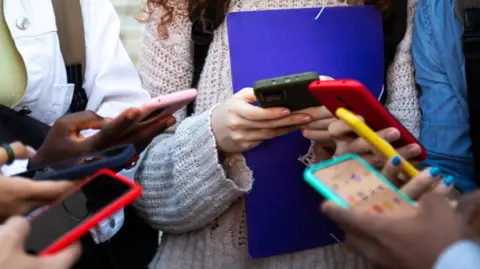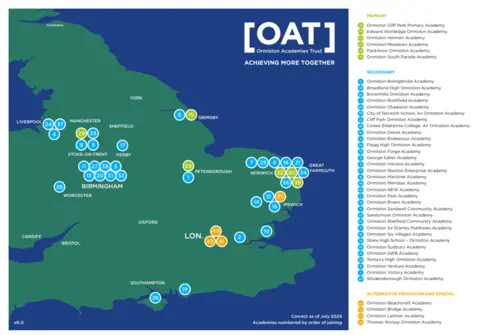One of England’s biggest school academy trusts to ban phone use

 Getty Images
Getty Images
One of England’s largest school academy trusts is set to ban phones during the school day.
Ormiston Academies Trust confirmed to the BBC it was phasing out access to smartphones for around 35,000 pupils at its 42 state schools across the country.
A spokesperson for the trust told the BBC that “teaching and learning, behaviour and children’s mental health are all impacted negatively by mobile phones”.
Earlier this year, the Department for Education under the previous Conservative government issued guidance intended to stop the use of mobile phones during the school day to “minimise disruption and improve behaviour in classrooms”.
Ormiston’s new measures will be put in place across all of its schools – which include six primaries and 32 secondaries, spanning as far north as Cheshire and as far south as the Isle of Wight.
Eight of its secondary schools have already piloted “different approaches” to the policy for the autumn term after consultation with parents, including one institution which has gone phone-free.
It has been “really successful” and “popular” with parents and students, the spokesperson said.
Access to phones is already prohibited at the trust’s primary, special needs and alternative provision schools.
“We want schools to do this at their pace – they are best placed to make the decisions because they know their schools best, and because we want them to take their parent and pupil communities with them,” the spokesperson added.

 Ormiston Academies Trust
Ormiston Academies Trust
Lift Schools, another multi-academy trust, told the BBC all 57 of its institutions operated a no-smartphones approach “so that students can focus on their learning”. Many of the schools use pouches which lock the device away during the day.
Rebecca Mahony, principal of the all-through Birkenhead High School Academy, told the BBC phones had been completely banned this year for junior students.
She said it followed an internal survey conducted by the school, in Wirrall in north-west England, which showed students as young as seven had been contacted online by strangers, asked to share photos of themselves and exposed to inappropriate content.
The school already had a policy of securing phones in lockers for its secondary students, which was first introduced seven years ago because pupils were becoming distracted, anxious and addicted to their devices, she added.
She said there was initially some pushback from parents who “wanted access to their children at all times” and “obviously the children didn’t like it at all” but now it is normal.
“I think parents are terrified and don’t know how to say no to their children. There’s a lot of peer pressure as well as far as buying phones for their children is concerned.”
But some parents have raised concerns with the BBC about the impact a total ban could have.
‘Dangerous and irresponsible’
Joe Mayatt, 37, from Hastings, has four children in two schools – one requires students to put phones in pouches and the other, Ark Alexandra Academy, has a total ban.
“The total ban is dangerous and irresponsible,” he said, explaining that his children relied on phones to find bus times and pay for things.
“I’d rather they could get in touch with me at any time. I agree they shouldn’t be used during the school day, but the school is neglecting their welfare before and after”, he added.
Helena Dollimore, MP for Hastings and Rye, raised the issue in Parliament this week, saying parents supported limiting phone use at the school but were concerned about safety on their journeys to and from home.
Announcing its policy this summer, the school’s vice principal, Sarah Butters, said becoming mobile-free was “the right thing to do” as phones were a distraction and had a negative impact on mental health.
The school did not have the resources and could not take on the liability to store nearly 1,800 phones, she said.
She said it was a misconception children were safer with phones, as they could be targets for theft. A parent could see when their child was registered as arriving via the school app, she added.
The BBC has approached the school for further comment.
Sian Jones, 43, from Hertfordshire, said her 12-year-old son uses a mobile phone app to monitor his glucose levels for Type 1 diabetes.
“The app saves his life every single day. He needs his phone,” she said.
“His school has been very understanding and accommodating about him having his phone.”
Tom Bennett, behaviour advisor for the Department for Education, told BBC Breakfast the “smartest thing” a school could do was ban smartphones, which he described as “attention hoovers”.
He said the government could go further than the department’s guidance and make it a statutory requirement for schools to ban phones, apart from in exceptional circumstances allowed by the head teacher.








